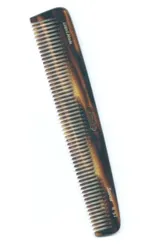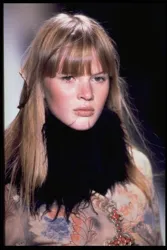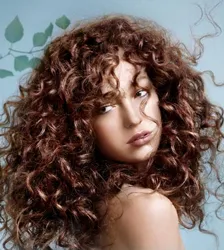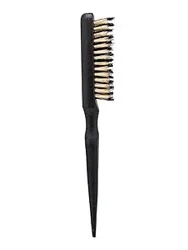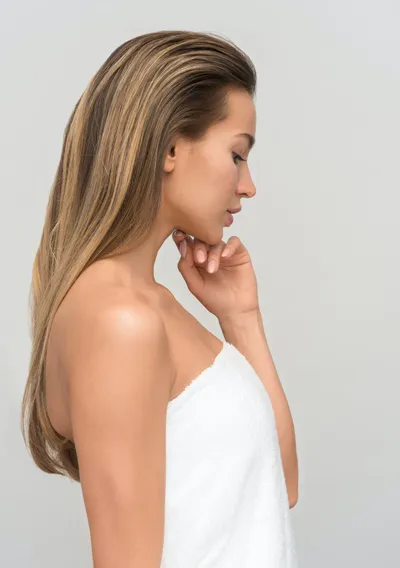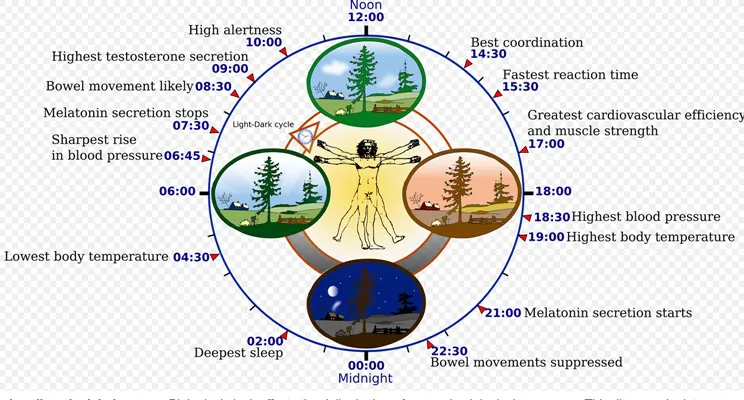
Finger Combing Hair How To
Finger Combing Hair How To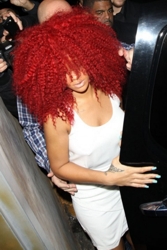 Finger combing, also called finger picking or finger raking, is exactly what it sounds like. It's using your fingers to comb, pick or rake through your tresses.
Finger combing, also called finger picking or finger raking, is exactly what it sounds like. It's using your fingers to comb, pick or rake through your tresses.
Some people use only one hand or a few target fingers at a time while others employ both hands and all fingers. This is a matter of personal preference.
(Image to the side of Rihanna. Does she or her celebrity hairstylist finger comb, pick or rake her hair?)
Performing Finger Combing
Finger combing can be performed on wet, damp or bone dry hair and is most popularly done during the follow times:
1. Pre-shower to detangle strands before cleansing or carefully pick out big knots or tangles.
2. During cleansing to distribute shampoo or similar cleansing products.3. After hair has been prepped with rinse-out conditioner to soften strands for easy detangling. Finger combing when the hair has lots of conditioner on it will give hair lots of slip and make it easy for many to detangle with fingers.
4. At the end of the cleansing cycle after hair has been towel blotted and coated with a styling cocktail consisting of a variety of hair care products ranging from a leave-in conditioner, defristant, styling creams, mousse or detanglers.5. During the hair drying cycle especially when rough drying or long finger diffusing.
6. On bone dry hair to tousle strands without breaking up newly formed scrunched waves, curls or other texture.7. At night before going to bed.
8. At any other time when a wide tooth comb is not available.9. In combination with other styling tools such as wide tooth hair friendly combs made out of soft non-scratchy materials.
10. When preparing hair for application of other products such as styling cocktails.11. During dry styling of hair into updos, twists or ponytails.
Some people only finger comb, some finger comb and use a wide tooth comb while others use finger combing, brushes, picks or wide tooth combs at different times.
Finger Combing Is Controversial
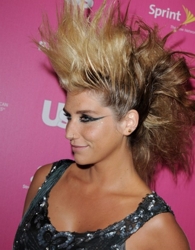 Although a simple hair styling concept used by many people, it's not without it's controversies.
Although a simple hair styling concept used by many people, it's not without it's controversies.
Why? Just like everything in the hair world not every technique or methodology works for every type of hair, texture, length or condition. For some people, finger combing is the only way to go.
Note: Does Keisha finger comb or not? Probably not for this hairstyle shown to the side.
For others finger combing can result in frizz, breakage, snarls, pulled hair and fuzzy ends.
Pros And Cons Of Finger Combing
Talk to twenty people and you will get twenty different pros and cons about finger combing. Why? The detangling, combing, raking and styling method does not work for everyone.
I have personally been finger combing, raking, picking and styling my hip length hair for many years. However, I have formulated a methodology which works best for my medium thick, wavy/curly hair.
Some people may never be able to finger comb, pick or rake. Some may be able to by finding the best approach for them. Remember that ultimately everyone needs to find the best methodology for their own hair.
Finger Combing By Hair Type, Texture, Length, Condition
 Listed below are some common thoughts about finger combing by hair type, texture, length and condition.
Listed below are some common thoughts about finger combing by hair type, texture, length and condition.
1. Damaged hair - Finger combing is considered more gentle than using a comb or brush. As a result it is often suggested to people with long or textured hair which is chemically damaged, extremely dry or prone to major knot formation and frizzing.
2. Naturally Curly, Coily, Kinky hair - Finger combing often creates more well-defined texture clumps such as curls, coils and kinks. For some it also minimizes fuzz and frizz. Many with natural curls or texture find that using a comb or brush on wet, damp or dry hair will disrupt the natural profile and lead to frizz. Other find that finger combing naturally textured hair is a no-no, regardless how wet or dry the curls are.3. Naturally Wavy hair - Waves are often better defined when hair is finger combed or raked.
4. Straight hair - Studies have shown that straight hair can tangle even worse than naturally textured tresses. Finger picking may often help either during the shower conditioning/detangling cycle or afterwards when hair is coated with styling cocktails.5. Thick hair - For hair which is medium to thick finger combing may not be an option since fingers may not be strong enough or wide enough to do the trick and may actually cause tangling. In some cases a comb or even a brush are necessary either to fully or partially detangle and/or style hair.
6. Thin/Fine hair - Finger combing either in the shower when hair is properly covered with a light volumizing conditioner or right after towel blotting seems to work best for the majority of people. Over combing may cause fine or thin hair to flatten.Key Finger Combing Advantages
 1. Prevents tearing, ripping or breakage - In some cases finger picking is more gentle and will be less likely to tear, rip of cause hair breakage. When there are big or stubborn knots the fingers can often untie the snarls more gently than a comb or brush.
1. Prevents tearing, ripping or breakage - In some cases finger picking is more gentle and will be less likely to tear, rip of cause hair breakage. When there are big or stubborn knots the fingers can often untie the snarls more gently than a comb or brush.
3. Can be easily combined with other tools - Many people find that finger combing offers a good start, but because of the time factor, the amount of hair they may have or a tight schedule they finish with a hair friendly comb.
4. Encourages familiarity with hair - If you finger comb your tresses on a regular basis you will begin to really known your strands on a very intimate level. You will be able to feel the areas where hair has a slightly different texture or shape or where it gets more dry or oily than other parts of the hair.5. May prevent damage to scalp - In some cases the teeth or bristles of a comb used to detangle may cause tiny scratches to the scalp. As long as fingers and nails are smooth and without rough patches, they are more gentle on the roots and the scalp.
Known Finger Combing Challenges
 1. Wet Or Dry Finger Combing - Some people can easily finger comb wet or damp hair, but not dry and vice versa. In some cases by applying 1-2 drops of jojoba or similar oils to the fingers and massaging well, dry hair will respond to finger combing as well as when hair is damp or wet. The oils will also serve to defrizz strands. Some oils work better or some types of hair then others.
1. Wet Or Dry Finger Combing - Some people can easily finger comb wet or damp hair, but not dry and vice versa. In some cases by applying 1-2 drops of jojoba or similar oils to the fingers and massaging well, dry hair will respond to finger combing as well as when hair is damp or wet. The oils will also serve to defrizz strands. Some oils work better or some types of hair then others.
3. Hands Or Clothes May Cause Static - Hands with rough skin or calluses or with sharp nails may actually snag strands or cause static in the hair. Also, sleeves or clothing edges may inadvertently rub against the hair causing fuzz to form. In some cases,, when hair is finger combed the hair, especially if fine or damaged, may tangle between the nails and the skin causing snags and rips.
4. Stretched Out Strands - It's a well-known fact that hair is more prone to breakage and overstretching when wet. Some people start with a light finger comb and then switch to a wooden, horn or other wide spaced, wide toothed comb to avoid over pulling on wet or damp strands.5. Misbehaving Ends - Finger combing may not be as beneficial to hair which is layered, has razored ends or has lots of splits. When the ends are hard to mange it's often better to use a wide-tooth comb to make sure the strands are all laying the same direction.
Other Finger Combing Tips
 1. Wet Or Dry Finger Combing - Some people can easily finger comb wet or damp hair, but not dry and vice versa. In some cases by applying 1-2 drops of jojoba, sweet almond, coconut or similar oils to the fingers and massaging well, wet and dry hair will respond better to finger combing. Applying oil when hair is wet will help prevent the over application of oils to the strands.
1. Wet Or Dry Finger Combing - Some people can easily finger comb wet or damp hair, but not dry and vice versa. In some cases by applying 1-2 drops of jojoba, sweet almond, coconut or similar oils to the fingers and massaging well, wet and dry hair will respond better to finger combing. Applying oil when hair is wet will help prevent the over application of oils to the strands.
Note: If you do use oils when finger combing don't forget to do a periodic chelating cleanse to remove oil build-up.
2. Avoid touching hair after finger combing is finished - When you have naturally curly or textured hair it may be prudent to finger comb to detangle or arrange clumps when hair is properly prepped with products.
Once finger combing is finished, stop touching curls while they dry to prevent frizz. It's a known fact that if you break up the curl pattern with the fingers or styling tools, you will cause frizz.
Other options include spraying hair with water or water mixed with a light conditioner before finger combing dry strands. Or combine with aloe vera gel or your favorite styling product to provide good definition for natural waves, curls or other similar textures.
Summary
 Some people may never be able to finger comb, pick or rake. Some may be able to by finding the best approach for them. Remember that ultimately everyone needs to find the best methodology for their own hair.
Some people may never be able to finger comb, pick or rake. Some may be able to by finding the best approach for them. Remember that ultimately everyone needs to find the best methodology for their own hair.
More Information
Please follow me on Twitter at: http://Twitter.com/HairBoutique. I look forward to meeting new people from all walks of Twitter and learning from their Tweets.
Visit us at Hairboutique.com located at: http://www.HairBoutique.com, on Facebook, MySpace and YouTube.
Thank you for visiting us at The HairBoutique Blog and for leaving your comments. They are very much appreciated. We apologize in advance but must remove any direct advertisements or solicitations.Social Media Network Information
Please follow us on Twitter at: https://Twitter.com/HairBoutique. I look forward to meeting new people from all walks of Twitter and learning from their Tweets.


